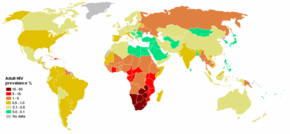HIV/AIDS in Armenia
Overview of HIV/AIDS in Armenia
HIV/AIDS in Armenia refers to the status and management of the HIV/AIDS epidemic in the country of Armenia. The disease has been a public health concern since the first case was reported in the late 1980s. Efforts to control and prevent the spread of HIV/AIDS in Armenia involve government initiatives, non-governmental organizations, and international partnerships.
Epidemiology[edit]

The first case of HIV in Armenia was diagnosed in 1988. Since then, the number of people living with HIV has steadily increased. As of 2023, it is estimated that there are over 3,500 people living with HIV in Armenia. The prevalence rate remains relatively low compared to global averages, but the disease continues to pose significant challenges.
The primary mode of HIV transmission in Armenia is through heterosexual contact, followed by intravenous drug use. The epidemic is concentrated among key populations, including men who have sex with men (MSM), sex workers, and people who inject drugs (PWID).
Prevention and Control[edit]
Armenia has implemented various strategies to prevent the spread of HIV. These include:
- Education and Awareness Campaigns: Public health campaigns aim to increase awareness about HIV transmission and prevention methods.
- Condom Distribution: Free condoms are distributed in high-risk areas and among key populations.
- Needle Exchange Programs: These programs provide clean needles to PWID to reduce the risk of HIV transmission.
- Voluntary Counseling and Testing (VCT): VCT services are available to encourage individuals to know their HIV status.
Treatment and Care[edit]
The Armenian government provides free antiretroviral therapy (ART) to all individuals diagnosed with HIV. The treatment is supported by international organizations such as the Global Fund to Fight AIDS, Tuberculosis and Malaria.

Challenges[edit]
Despite progress, Armenia faces several challenges in combating HIV/AIDS:
- Stigma and Discrimination: People living with HIV often face social stigma, which can discourage individuals from seeking testing and treatment.
- Limited Resources: Financial and human resources for HIV prevention and treatment are limited.
- Access to Services: Geographic and economic barriers can limit access to healthcare services, particularly in rural areas.
International Cooperation[edit]
Armenia collaborates with various international organizations to enhance its response to HIV/AIDS. Partnerships with the World Health Organization (WHO), the United Nations Programme on HIV/AIDS (UNAIDS), and other entities provide technical and financial support.
Related pages[edit]
Ad. Transform your life with W8MD's Budget GLP-1 injections from $75


W8MD offers a medical weight loss program to lose weight in Philadelphia. Our physician-supervised medical weight loss provides:
- Weight loss injections in NYC (generic and brand names):
- Zepbound / Mounjaro, Wegovy / Ozempic, Saxenda
- Most insurances accepted or discounted self-pay rates. We will obtain insurance prior authorizations if needed.
- Generic GLP1 weight loss injections from $75 for the starting dose.
- Also offer prescription weight loss medications including Phentermine, Qsymia, Diethylpropion, Contrave etc.
NYC weight loss doctor appointmentsNYC weight loss doctor appointments
Start your NYC weight loss journey today at our NYC medical weight loss and Philadelphia medical weight loss clinics.
- Call 718-946-5500 to lose weight in NYC or for medical weight loss in Philadelphia 215-676-2334.
- Tags:NYC medical weight loss, Philadelphia lose weight Zepbound NYC, Budget GLP1 weight loss injections, Wegovy Philadelphia, Wegovy NYC, Philadelphia medical weight loss, Brookly weight loss and Wegovy NYC
|
WikiMD's Wellness Encyclopedia |
| Let Food Be Thy Medicine Medicine Thy Food - Hippocrates |
Medical Disclaimer: WikiMD is not a substitute for professional medical advice. The information on WikiMD is provided as an information resource only, may be incorrect, outdated or misleading, and is not to be used or relied on for any diagnostic or treatment purposes. Please consult your health care provider before making any healthcare decisions or for guidance about a specific medical condition. WikiMD expressly disclaims responsibility, and shall have no liability, for any damages, loss, injury, or liability whatsoever suffered as a result of your reliance on the information contained in this site. By visiting this site you agree to the foregoing terms and conditions, which may from time to time be changed or supplemented by WikiMD. If you do not agree to the foregoing terms and conditions, you should not enter or use this site. See full disclaimer.
Credits:Most images are courtesy of Wikimedia commons, and templates, categories Wikipedia, licensed under CC BY SA or similar.
Translate this page: - East Asian
中文,
日本,
한국어,
South Asian
हिन्दी,
தமிழ்,
తెలుగు,
Urdu,
ಕನ್ನಡ,
Southeast Asian
Indonesian,
Vietnamese,
Thai,
မြန်မာဘာသာ,
বাংলা
European
español,
Deutsch,
français,
Greek,
português do Brasil,
polski,
română,
русский,
Nederlands,
norsk,
svenska,
suomi,
Italian
Middle Eastern & African
عربى,
Turkish,
Persian,
Hebrew,
Afrikaans,
isiZulu,
Kiswahili,
Other
Bulgarian,
Hungarian,
Czech,
Swedish,
മലയാളം,
मराठी,
ਪੰਜਾਬੀ,
ગુજરાતી,
Portuguese,
Ukrainian